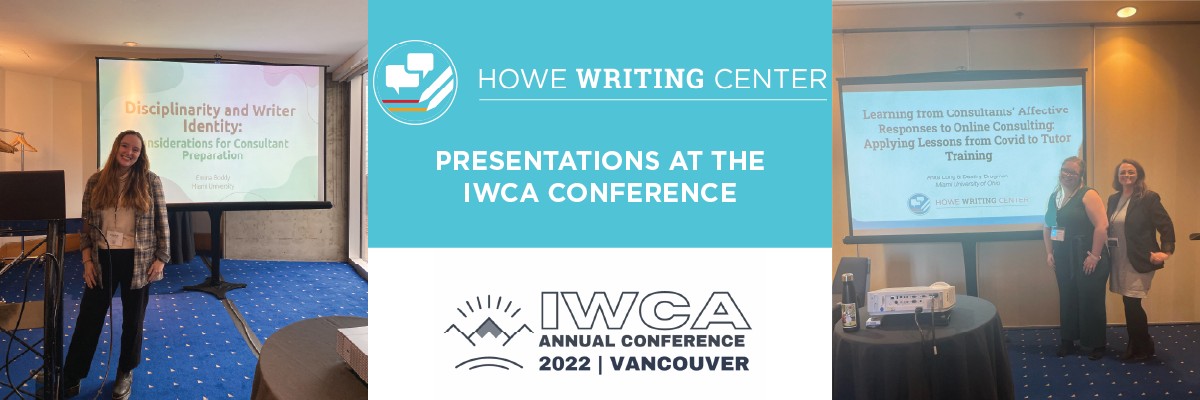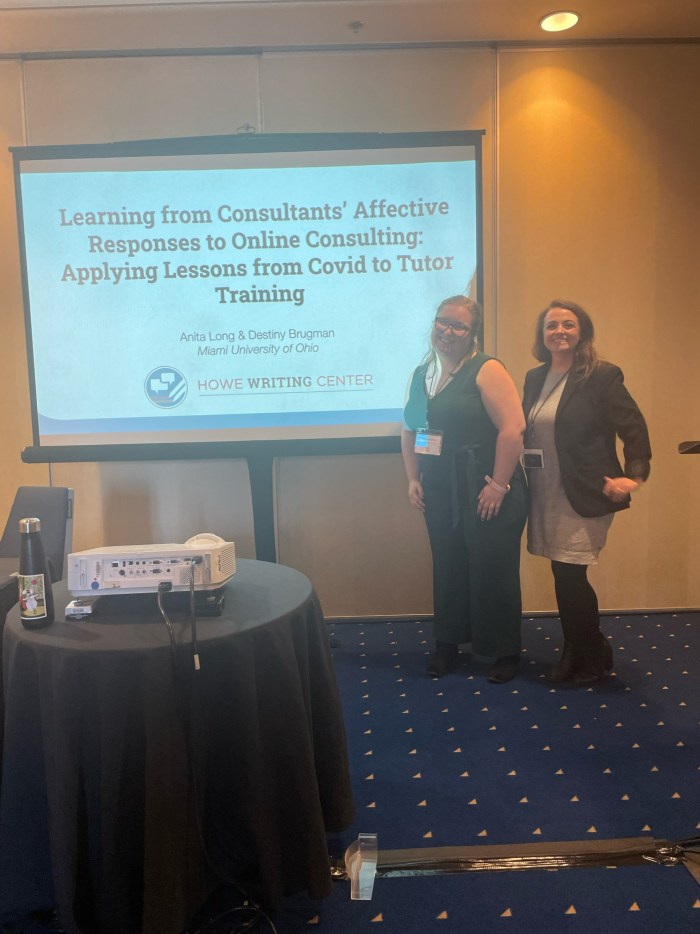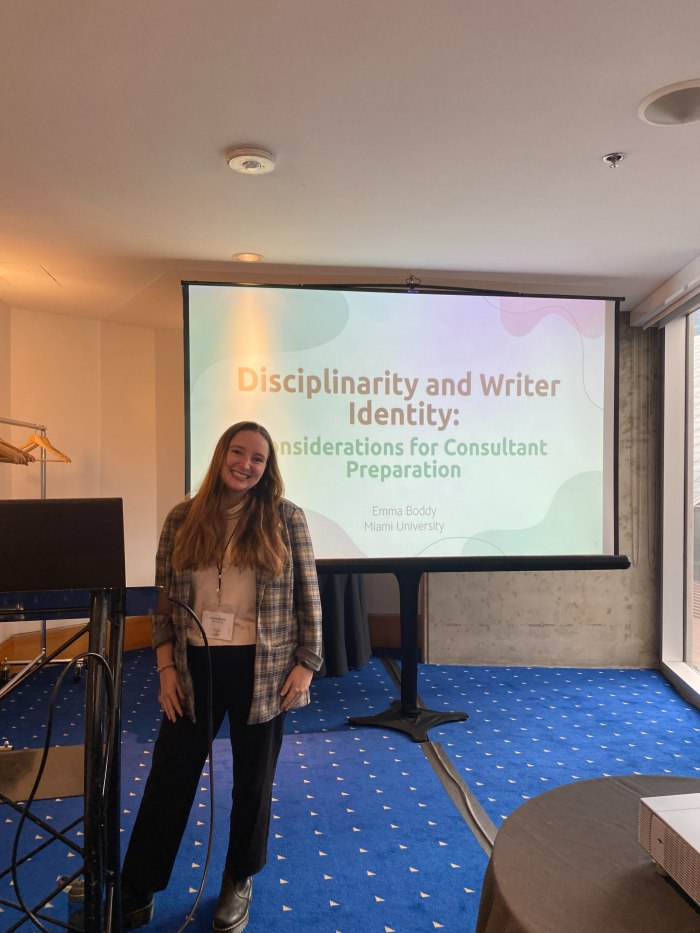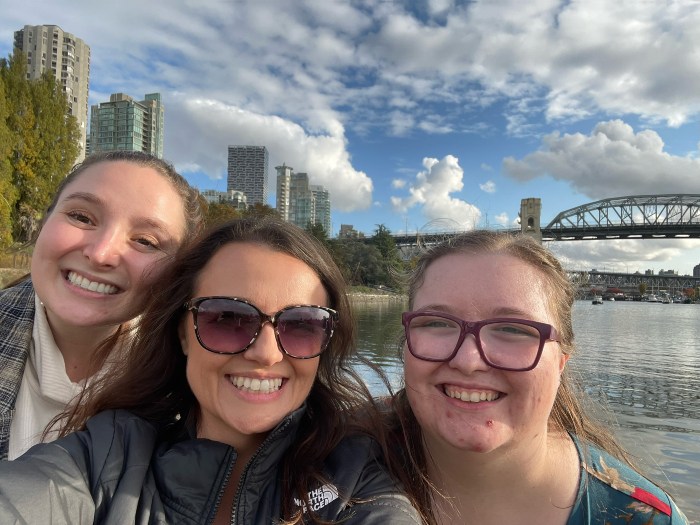Miami Graduate Students Head to Vancouver to Present at the International Writing Centers Association Annual Conference 2022
The Howe Center emphasizes that writing is collaborative, and as such, so is the scholarship surrounding it. From October 27 through October 29, 2022, three graduate students at Miami University–all of whom have or currently work as graduate assistant directors at the Howe Center for Writing Excellence–attended the International Writing Centers Association (IWCA) Annual Conference in Vancouver, British Columbia.
Miami Graduate Students Head to Vancouver to Present at the International Writing Centers Association Annual Conference 2022
 The Howe Center emphasizes that writing is collaborative, and as such, so is the scholarship surrounding it. From October 27 through October 29, 2022, three graduate students at Miami University–all of whom have or currently work as graduate assistant directors at the Howe Center for Writing Excellence–attended the International Writing Centers Association (IWCA) Annual Conference in Vancouver, British Columbia.
The Howe Center emphasizes that writing is collaborative, and as such, so is the scholarship surrounding it. From October 27 through October 29, 2022, three graduate students at Miami University–all of whom have or currently work as graduate assistant directors at the Howe Center for Writing Excellence–attended the International Writing Centers Association (IWCA) Annual Conference in Vancouver, British Columbia.
 Destiny Brugman, a PhD student in the Composition & Rhetoric program at Miami University and current graduate assistant director for the Howe Writing Center, and former graduate assistant director Anita Long, also a PhD student in Composition & Rhetoric, presented their findings on the topic of writing consultants’ affective responses to the COVID-19 pandemic in connection to tutor training. Their empirical research focused on discussions they had with three distinct groups of consultants: 1) Those trained prior to the remote shift; 2) Those trained during the remote shift; and 3) Those trained after the remote shift. Brugman and Long examined how differences in training affected consultants as they navigated written online, live online, and in-person consultation appointments.
Destiny Brugman, a PhD student in the Composition & Rhetoric program at Miami University and current graduate assistant director for the Howe Writing Center, and former graduate assistant director Anita Long, also a PhD student in Composition & Rhetoric, presented their findings on the topic of writing consultants’ affective responses to the COVID-19 pandemic in connection to tutor training. Their empirical research focused on discussions they had with three distinct groups of consultants: 1) Those trained prior to the remote shift; 2) Those trained during the remote shift; and 3) Those trained after the remote shift. Brugman and Long examined how differences in training affected consultants as they navigated written online, live online, and in-person consultation appointments.
In particular, Brugman and Long argue that affect matters, community matters, and modality matters, placing emphasis on how consultants respond to and support each other through various modalities. “Community continues to be one of the most valuable resources consultants have for each other,” Brugman wrote. “They’re able to bounce ideas off of each other and troubleshoot—especially when doing their online consulting.”
Long emphasized that their goal with presenting their research was to “share our methods and where we are in the project so far, as well as the significant patterns we’ve noticed emerging from across the interviews in order to develop key takeaways about what they might mean.”
 Emma Boddy, another graduate assistant director with the Howe Writing Center and graduate student in Composition & Rhetoric, presented empirical research on senior double-major undergraduate students and the struggles they face in writing across multiple disciplines. Boddy’s focus was on questions related to disciplines and writer identity. By developing a better understanding of the challenges writers face, Boddy argues, it is possible to build better programming that can help consultants best support writers.
Emma Boddy, another graduate assistant director with the Howe Writing Center and graduate student in Composition & Rhetoric, presented empirical research on senior double-major undergraduate students and the struggles they face in writing across multiple disciplines. Boddy’s focus was on questions related to disciplines and writer identity. By developing a better understanding of the challenges writers face, Boddy argues, it is possible to build better programming that can help consultants best support writers.
Boddy also offered a framework that institutions can implement to better support writing consultants in their efforts to understand the complex relationships between disciplines and genre-specific expectations for writers. Her primary goal was for presentation participants to leave the session with a model of questioning which consultants can use in their work to best support writers.
The experience afforded Brugman, Long, and Boddy with much context to inform their own work with the Howe Center for Writing Excellence, as well as an exciting glimpse into the world of writing center administration, operation, and research. “As this was the first in-person academic conference I’ve attended, I was blown away,” Boddy writes. “This conference broadened my perspective of what it means to be involved in the field of writing centers as well as confirmed my focus of what conversations within that field I am most drawn to.”
Brugman details a similar experience and was particularly positive on the collaborative and generative aspects of the conference. “We met many pleasant and supportive writing center practitioners who were interested in collaborating and sharing ideas based on the different experiences that we have based on our experiences and theirs,” she wrote. “It was a very generative event that has helped us push our research ideas further, learn from others, and make connections with writing center directors and consultants across the country/world.”
 Long echoed her colleagues’ experiences, citing accessibility, equity, inclusion, and technology as some of the highlighted topics from the event. “Writing center work is a broad umbrella encompassing an exciting array of scholarship,” she wrote.
Long echoed her colleagues’ experiences, citing accessibility, equity, inclusion, and technology as some of the highlighted topics from the event. “Writing center work is a broad umbrella encompassing an exciting array of scholarship,” she wrote.
“There’s a lot of really cool and important work going on surrounding accessibility, relationship building across the university, and writing center outreach that we can learn from both in terms of our own writing center admin practices but also in our academic and research practices,” Brugman stated.
“It was so amazing to be a part of this open but focused discussion with writing center scholars from around the world,” Boddy added. “It made me realize the immense amount of passion and thought that goes into all of our writing centers and the ways in which sharing and building on those ideas as a community make them even more powerful.”